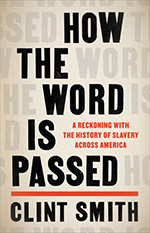Reviewed by Vicki Foreman
 The author takes us on a journey to monuments and landmarks that tell the story of slavery in America. Some are honest in their story telling and some are not, but each provide a deeply insightful look at the impact slavery had and continues to have on our country. There are seven stops along the journey, and each is delivered in compelling narrative that keeps the reader engaged long after they thought it might be time for bed.
The author takes us on a journey to monuments and landmarks that tell the story of slavery in America. Some are honest in their story telling and some are not, but each provide a deeply insightful look at the impact slavery had and continues to have on our country. There are seven stops along the journey, and each is delivered in compelling narrative that keeps the reader engaged long after they thought it might be time for bed.
Can you share a quote from the book that was meaningful to you?
"I've come to realize that there's a difference between history and nostalgia, and somewhere between those two is memory," he said. "I think that history is the story of the past, using all the available facts, and that nostalgia is a fantasy about the past using no facts, and somewhere in between is memory, which is kind of this blend of history and a little bit of emotion…I mean, history is kind of about what you need to know…but nostalgia is what you want to hear."
What was a new thought or a key takeaway?
Television, movies, and books have given dramatic portrayals of enslaved families being separated, but nowhere has the stark reality of the trauma, pain, horror, and despair of this practice been made more real than in Smith's book. The impact of losing one's spouse, child, or parent is not presented for dramatic effect. The reality of what that meant to the very real people who were treated like farm animals wrenches to the core. "The splitting of families was not peripheral to the practice of slavery; it was central."
Most of us know the incongruity of Thomas Jefferson's words, "All Men are Created Equal", and his ownership of enslaved human beings. We likely never thought of him splitting up families. When did we learn that despite his written opinion that emancipation was the proper course, all of his enslaved workers, about 200, were auctioned off after his death to pay his debts, splitting families forever?
What action will you take as a result of reading this book?
The author reminds us that "there are people still alive today who knew and held and loved people who were born into slavery." He also reminds us that "this history is in our soil, it is in our policies, and it must, too, be in our memories." I am inspired to know more and to better understand how our history informs our present. I want to listen to how the word continues to be passed and how it matters in our relationships, in our behavior, and in our policies across this land where our founding documents say all men are created equal, but our history often tells a different story. What do I need to know and not just what is easier to hear?
Is there anything else you'd like to share about this book?
Clint Smith is a gifted writer. He is also a diligent researcher and empathetic listener. From Monticello, to Blandford Cemetery, to New York City and spots in between he weaves first person conversation, primary source historical documents, and current events into a tapestry that draws the reader into wanting more.
